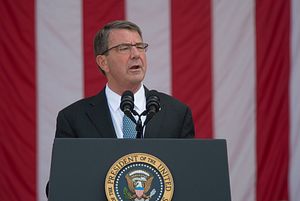U.S. Defense Secretary Ashton Carter recently made some controversial comments about China’s actions in the Asia-Pacific, especially the South China Sea, saying that China is “erecting a great wall of self-isolation” there. Not surprisingly, Chinese foreign ministry spokeswoman Hua Chunying refuted Carter’s comments by referring to them as reflective of a ‘Cold War’ mentality. Whether or not Ashton Carter and the United States hold a ‘Cold War’ mentality is debatable, but the facts in the Asia-Pacific contradict Carter’s description of China’s position.
While Carter was right in saying that some of U.S. allies and partners are voicing concerns both publicly and privately about China’s actions, the United States should make a distinction between words and actions. In other words, the United States should not take some countries’ words at face value. It is entirely possible that some U.S. partners only say things that the United States wants to hear and hope to gain U.S. military and economic assistance in hedging against China as a result.
Both publicly and privately, those countries also very much welcome China’s economic investment and trade overtures. As a result, we should always be careful in distinguishing words and true intentions. Ultimately, there is the danger of the United States becoming trapped in a conflict with China that it does not want in the first place. It is not uncommon that great powers have paid a huge price for over-committing to the protection of their smaller allies from a historical point of view.
Do countries in Asia Pacific want to isolate China? I guess not. Even for Japan, the most likely rival to China’s rise, its interdependent relationship with China makes it impossible for Tokyo to fully isolate Beijing. Doing that would hurt Japan’s national interests. According to a poll by Pew Research in 2015, China’s image among its Asian neighbors is actually quite positive, ranked second only behind Japan. Even in the Philippines, 54 percent of people view China favorably. This might suggest why the newly elected president of the Philippines, Rodrigo Duterte, wants to improve China-Philippines relations.
Does China want to self-isolate? Such a thing would be impossible in this era of globalization. For the past three decades, China has been of the biggest beneficiaries of globalization (the United States being another); why would China want to isolate itself now? While it is true that in the South China Sea China other claimant countries have different views from Beijing, it has never been the case that such differences cannot be resolved through peaceful means and dialogue. Indeed, it has always been China’s policy to resolve such disputes through bilateral dialogues and negotiations under international law. According to MIT Professor Taylor Fravel’s study, in the past two decades, China has successfully resolved many disputes with neighboring countries, including Russia.
China’s rise and its impact on the entire Asia-Pacific region certainly will pose challenges to the United States and its allies in Asia. There is no need to deny such challenges. Nonetheless, it is useless and even counterproductive for senior U.S. officials to call out China with provocative language. The same goes to China as well. Both sides need to maintain calmness in viewing each other’s challenges, understanding that cooperation is indeed better than conflict. China will not isolate itself, unless other countries decide to isolate China. To integrate China to a more dynamic and diverse international society is ultimately in China and other countries’ national interests. Let us not forget this important lesson.

































